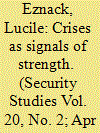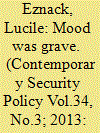|
|
|
Sort Order |
|
|
|
Items / Page
|
|
|
|
|
|
|
| Srl | Item |
| 1 |
ID:
105852


|
|
|
|
|
| Publication |
2011.
|
| Summary/Abstract |
Affect exists among close allies and influences their actions and reactions vis-à-vis each other. These countries' perceptions of, and affective attachment to, the specialness of their relationships explains why, in certain circumstances, big clashes occur among them. In this sense, affect explains why crises among close allies are more signals of strength than weakness: the passionate nature of such crises-as opposed to more routine or recurrent disagreements-is triggered by the high value placed by close allies on their ties and not, as often stated in the literature, by the erosion of these ties. After developing this argument, I illustrate it with the analysis of two crises among close allies: the Suez crisis between Britain and the United States in late 1956, and the Iraq crisis between France and the United States in early 2003. I then contrast these episodes with a crisis between two allies with a much less affectively charged relationship-the United States and Turkey, also in early 2003 over the Iraq War issue.
|
|
|
|
|
|
|
|
|
|
|
|
|
|
|
|
| 2 |
ID:
125008


|
|
|
|
|
| Publication |
2013.
|
| Summary/Abstract |
Recent developments in international relations and international security scholarship emphasize the need to consider emotions in explaining interstate behaviour. Less work has been done exploring the difference between emotions - or emotional reactions - and the longer-term affective dispositions they can trigger, affecting foreign and security policy. Affective dispositions towards objects, it is argued here, provoke different emotional reactions towards events affecting this object, even though the observed emotions might be labelled the same. Hence, an interstate dispute will elicit different anger expressions and related behaviours if the countries concerned are friends (with positive affective dispositions) or enemies (with negative affective dispositions towards each other). This article shows that state behaviours that otherwise would seem inconsistent or contradictory are explained by their affective dispositions. Countries tend to be more restrained in their anger-related behaviours towards friends than towards enemies. The argument is illustrated by America's emotional reaction to the behaviour of Britain during the 1956 Suez crisis, compared to its reaction to the Soviet Union following the 1979-1980 invasion of Afghanistan. The emotional reactions in these cases are not specific to Washington. Other countries, such as the Czech Republic, France, Hungary, and Poland, displayed similar tendencies during the Iraq crisis of 2003, as did Britain, France, and Germany over intervention in Libya in 2011, in which anger and anger-related behaviours were influenced by the affective dispositions.
|
|
|
|
|
|
|
|
|
|
|
|
|
|
|
|
|
|
|
|
|